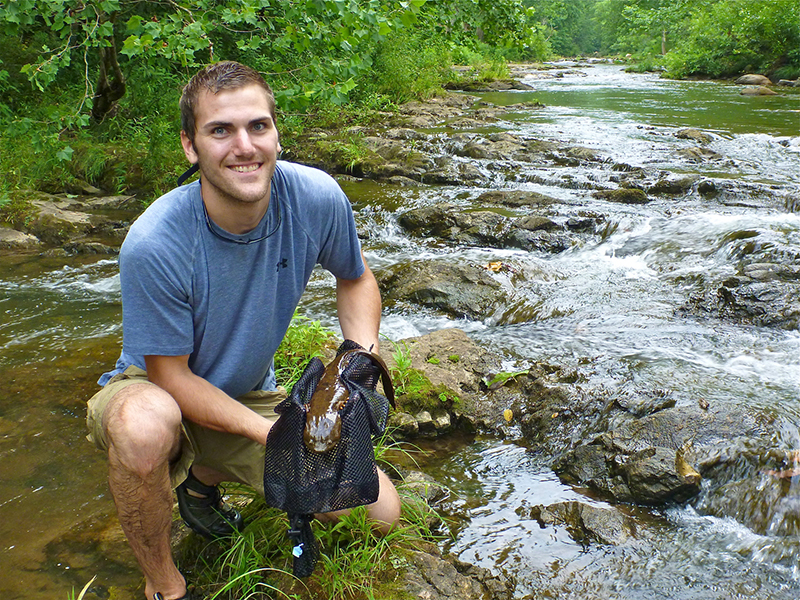Facilitated Learning for Developing Graduate Experiences (FLeDGE)
 In 2008, with support from the National Science Foundation, Dr. Bill Hopkins established a formal mentoring program called Facilitated Learning for Developing Graduate Experiences (FLeDGE). The FLeDGE program facilitates reciprocal learning by pairing a graduate student or post doc (the mentor) with an undergraduate researcher conducting a senior thesis project in the Hopkins laboratory. The program requires a minimum 18-month commitment by both the undergraduate and mentor. The goal of this comprehensive program is to prepare undergraduates for their upcoming transition to graduate school, while simultaneously preparing graduate students and postdocs for their eventual transition into a faculty position. Undergraduates receive hands-on training with all major aspects of academic research including writing, critical thinking, experimental design, laboratory and field techniques, animal care and use, data management and analysis, and oral presentations.
In 2008, with support from the National Science Foundation, Dr. Bill Hopkins established a formal mentoring program called Facilitated Learning for Developing Graduate Experiences (FLeDGE). The FLeDGE program facilitates reciprocal learning by pairing a graduate student or post doc (the mentor) with an undergraduate researcher conducting a senior thesis project in the Hopkins laboratory. The program requires a minimum 18-month commitment by both the undergraduate and mentor. The goal of this comprehensive program is to prepare undergraduates for their upcoming transition to graduate school, while simultaneously preparing graduate students and postdocs for their eventual transition into a faculty position. Undergraduates receive hands-on training with all major aspects of academic research including writing, critical thinking, experimental design, laboratory and field techniques, animal care and use, data management and analysis, and oral presentations.
Our undergraduate researchers are treated like first year graduate students, with a high degree of professionalism and high expectations. Conversely, graduate students and postdocs gain tremendous experience with daily mentorship of undergraduates and all aspects of project oversight and management. By assisting the undergraduate researchers with all aspects of their research project the mentors develop a vested interest in the success of the project and the student. The graduate students and postdocs learn first-hand about the rewards and challenges of mentoring as they work through iterations of project proposals, power point presentations, etc. Throughout the process, Hopkins engages in “team meetings” to evaluate progress of both the mentor and undergraduate student. Each undergraduate researcher receives graded course (Independent Study) credit from the University each semester that they are enrolled.

Undergraduate researcher, David Drewett
During their first semester undergrads are required to write a project proposal which is critically evaluated by multiple members of the laboratory. They then present and defend their proposal during an interactive forum with all lab members (students, post docs, technicians) and faculty and students from multiple departments around campus. After completing their research project during the second and third semesters, the student is required to produce a publication quality report of their findings and to present their findings to the laboratory before graduation. To ensure that each undergraduate and mentor have a fulfilling research experience, no more than two students are accepted into this program per year.
Thus far, six undergraduate students, two graduate students, and three postdoctoral fellows have been involved in the program. The first two undergraduate students, Brittney Hopkins [mentor Dr. Sarah DuRant] and John Burke [mentor Christine Bergeron]), graduated in 2009 and moved on to graduate programs. These two students have first-authored manuscripts that are currently published in Environmental Pollution and Journal of Experimental Zoology. The undergraduate student involved in 2010 (Amanda Wilson [mentor Dr. Sarah DuRant]), graduated and spent an additional year in the Hopkins laboratory as a post baccalaureate research fellow. Amanda recently accepted a PhD position with Dr. Rachel Bowden at Illinois State University. David Drewitt and Stephanie Chin [mentor Dr. J.D. Willson] finished their projects in May of 2012. Stephanie is starting graduate school at William and Mary in 2013 and will be working with Dr. Dan Cristol. Our most recent graduate, Lisa Trapp [mentor Dr. Michelle Beck], finished her work in the FLeDGE program in May of 2013.
FLeDGE PARTICIPANTS
Alex Grimaudo (2017-2019; mentor: Sydney Hope): Project title: The effects of clutch size and environmental conditions on night incubation behavior in wood ducks.
Valentina Alaasam (2013-2014; mentor: Cathy Jackowski): Project title: Morphology and physiology of brooding and non-brooding hellbenders (Cryptobranchus alleganiensis).
Lisa Trapp (2012-2013; mentor: Michelle Beck): Lisa examined the relationship between stress response and personality in tree swallows (Tachycineta bicolor).
Stephanie Chin (2011-2012; mentor: J.D. Willson): Project title: Maternal transfer of mercury in the northern watersnake (Nerodia sipedon): effects on offspring locomotor performance, foraging, and learning.
David Drewett (2011-2012; mentor: J.D. Willson): Project title: Factors influencing inter- and intra-specific variation in mercury bioaccumulation by snakes inhabiting a contaminated river floodplain. Click here for pdf.
Amanda Wilson (2009-2011; mentor: Sarah DuRant): Project title: Thermal challenge severity differentially influences wound healing in Wood Duck (Aix sponsa) ducklings.
Brittney Hopkins (2008-2009; mentor: Sarah DuRant): Project title: Maternal effects in birds: early developmental environment influences locomotor performance in young wood ducks (Aix sponsa).
John Burke (2008-2009; mentor: Christine Bergeron): Project title: Effects of mercury on behavior and performance of northern two-lined salamanders (Eurycea bislineata).
